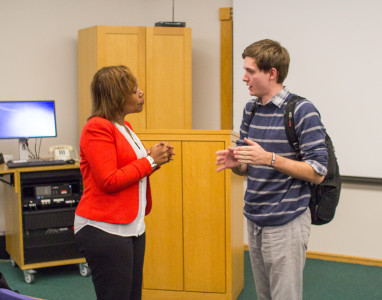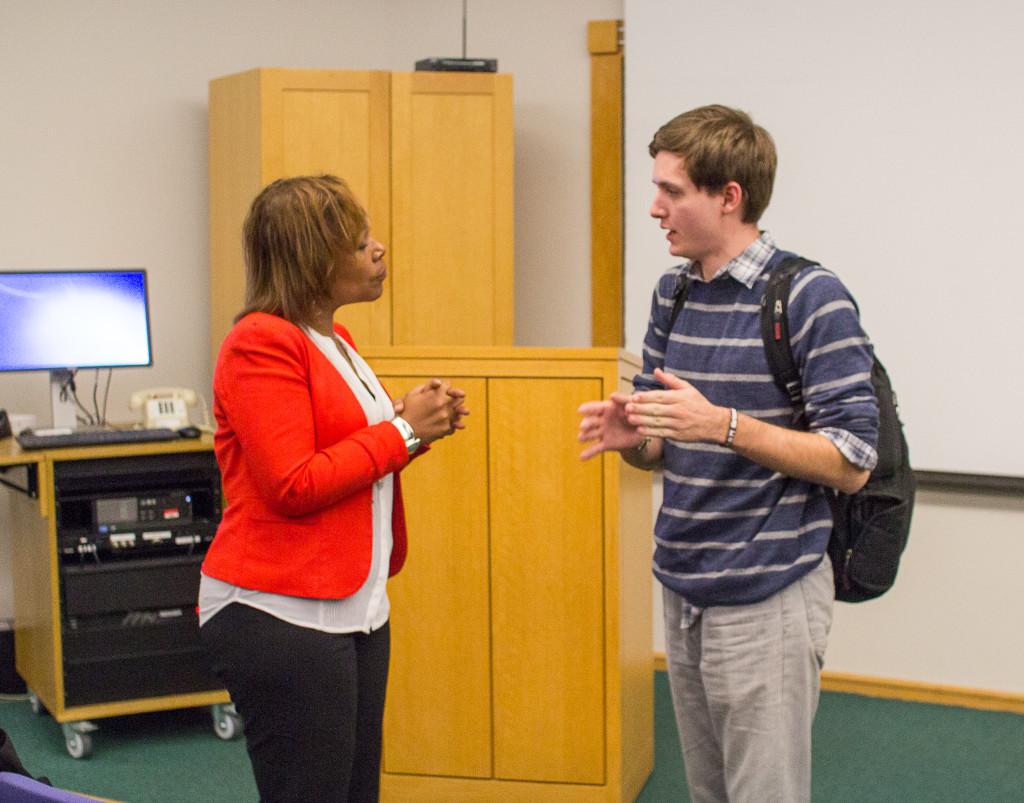
MICHAEL CUMMINGS, Staff Writer
cummings@grinnell.edu
The months leading up to the Iowa Caucuses are exciting times at Grinnell.
As candidates duke it out on national and local stages, Iowans watch closely, preparing for their crucial role in the nominating process. Last week, the Rosenfield Program brought civil rights lawyer Judith Browne Dianis to campus to give a speech kicking off caucus season.
Dianis, who is co-director of the DC-based organization Advancement Project, spoke on the topic of voting rights. Her talk examined where the country stands 50 years after the passage of the Voting Rights Act of 1965, which prohibited measures that would prevent racial minorities from voting.
“The passage of the Voting Rights Act is one of the defining victories of the Civil Rights Movement,” said Professor Doug Hess, Political Science, who introduced Dianis at her talk. “It would be hard to overstate the importance of the changes that flowed from that act.”
The talk focused on the ways in which the United States is still struggling in terms of voting rights even today.
“Fifty years after the passage of the voting rights act, we are still seeing attempts to make it harder to vote for certain groups in our country,” Dianis said. “One way to fix it is to actually pass a right-to-vote amendment to the Constitution.”
Although the Voting Rights Act gave more people access to the ballot, Dianis noted that recently the Supreme Court has made rulings that have reversed much of the progress made on the issue.
“The Supreme Court’s decision basically dealt a blow to [Section 5 of] the Voting Rights Act,” Dianis said, adding that Section 5 was a provision which “required states, mostly in the South, which had a history of discrimination to get the U.S. Department of Justice to pre-approve any changes to voting before they implemented them.”
The controversial case, Shelby County v. Holder, is seen by many as a roadblock to minority voting rights.
“The Supreme Court struck down the formula to decide which states would be covered. Right now what that means is that in Southern states like Alabama, Georgia, Mississippi, who have a long level of voting discrimination, there is not that level of protection for voters,” Dianis said.
In the time since the Shelby County case, many states which were previously constrained in their ability to change voting laws have taken steps to limit the right to vote of minorities. One such way includes voter identification laws, which require citizens to show a valid form of ID before they can vote.
Dianis argues that voter ID laws specifically target minority groups, as Blacks and Hispanic Americans are less likely to have a valid form of ID than White Americans. Proponents of voter ID laws say that they help prevent voter fraud, an argument which Dianis challenged.
“You are more likely to be struck by lightning than you are to find a prosecutable case of voter fraud,” Dianis said. “Not only that, but you’re more likely to see a UFO than you are to find a prosecutable case of voter fraud.”
Dianis noted that, despite the extreme importance of this issue, it is not frequently discussed by political candidates.
“Politicians don’t like to talk about voting rights during an election season,” she said. “To invoke the Voting Rights Act in the middle of an election cycle actually means that you’re getting ready to talk about race. A lot of folks don’t like to talk about race when they’re running for President.”
Dianis concluded her talk with one last call for a Constitutional amendment. She acknowledged that that would involve a long, drawn-out process which would likely not conclude until after she had retired, but said that it is an absolute necessity to protect the rights of all Americans.





























































